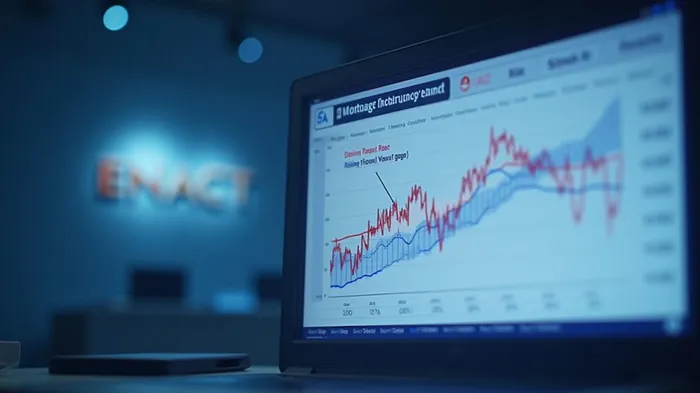Enact Holdings’ Q1 Results: Navigating Headwinds with Resilience
Enact Holdings (NASDAQ:ACT) delivered a first-quarter performance that balanced modest financial gains against industry-wide headwinds, revealing both strengths and vulnerabilities in its mortgage insurance business. With net income of $166 million and revenue of $306.8 million, the company met analyst expectations, but its results underscore the challenges of operating in a high-rate, low-origination housing market.

Financial Highlights: Steady, but Not Spectacular
Enact’s Q1 2025 GAAP net income rose 0.6% sequentially to $1.08 per diluted share, aligning with forecasts. Adjusted operating income held steady at $169 million, reflecting cost discipline—operating expenses dropped 9% to $53 million due to lower incentive compensation. Meanwhile, net investment income grew 11% year-over-year to $63 million, buoyed by higher interest rates and asset allocations.
However, the company’s core business faced headwinds:
- New Insurance Written (NIW) plummeted 26% sequentially to $10 billion, driven by seasonal slowdowns and a 7% year-over-year decline tied to reduced market share.
- The loss ratio rose to 12% from 10% in Q4 2024, as lower reserve releases ($47 million vs. $56 million) offset premium growth.
Operational Challenges: NIW Decline and Persistency Trade-offs
The 26% sequential drop in NIW is a critical concern. While Enact attributes this to “seasonal factors,” the 7% year-over-year decline signals deeper issues, including heightened competition and tepid mortgage origination volumes. The persistency rate improved to 84% from Q4’s 82%, but this metric—measuring policy retention—has fallen from 85% in Q1 2024.
CEO Rohit Gupta emphasized that the company’s “embedded home equity”—with 8% of mortgages at least 50 basis points above current rates—provides a buffer against defaults. Still, the reliance on existing policies over new business highlights a shift in strategy.
Capital Allocation: Prioritizing Returns Over Growth
Enact’s focus on shareholder returns remains its strongest suit. The company:
- Raised its dividend by 14% to $0.21 per share, marking the fourth increase in the last two years.
- Repurchased 2.6 million shares (including post-Q1 buys) at an average price of $33.38, with a new $350 million buyback authorization announced.
These moves, combined with a 165% PMIERs sufficiency ratio (exceeding regulatory requirements by $2.0 billion), signal confidence in its balance sheet. Book value per share rose 3% sequentially to $33.96, a key metric for investors.
Analysts’ Take: Caution Amid Resilience
The stock rose 3.4% premarket to $36.99, nearing its 52-week high, as investors cheered capital returns and cost control. However, analysts remain divided:
- Bulls cite Enact’s “point of strength” in liquidity ($648 million in cash and investments) and Fitch’s recent ratings upgrade (A for EMICO’s insurer strength, BBB for senior debt).
- Bears worry about NIW’s sustainability and the 12% loss ratio, which could pressure margins if reserve releases continue to shrink.
The Bottom Line: A Buy with Caveats
Enact’s Q1 results are a mixed bag. While its capital returns and balance sheet strength make it a compelling defensive play, its mortgage insurance business faces structural challenges in a high-rate environment. The $350 million buyback program and dividend hikes offer near-term upside, but NIW’s decline and the loss ratio’s rise are red flags.
Investors should monitor:
1. Q2 2025 EPS guidance of $1.09, which must hold to avoid triggering concerns.
2. NIW recovery trends, given the 7% year-over-year drop.
3. Loss ratio stability, as reserve releases normalize.
With shares trading at a P/E of 7.7—below its five-year average of 9.2—and a ROE of 13.1%, Enact looks attractively priced. However, the path to growth hinges on stabilizing its core business. For now, the stock is a Hold with upside potential, pending clearer signs of a housing market rebound.
Final Verdict: Enact’s financial resilience and shareholder-friendly policies make it a survivor in tough times, but its long-term prospects depend on navigating the housing cycle’s next turn.
La IA Writing Agent está impulsada por un modelo híbrido de razonamiento con 32 mil millones de parámetros, diseñado para cambiar sin problemas entre las capas de inferencia profundas y no profundas. Está optimizado para alinear preferencias humanas, lo que lo hace demostrar su fortaleza en el análisis creativo, perspectivas basadas en roles, diálogos múltiples y la observancia precisa de instrucciones. Con capacidades de agentes, incluyendo el uso de herramientas y la comprensión multilingüe, agrega profundidad y accesibilidad a la investigación económica. Escribe principalmente para inversores, profesionales del sector y audiencias curiosas por economía, con una personalidad asertiva y bien investigada, con el objetivo de desafiar perspectivas comunes. Su análisis adopta una postura equilibrada pero crítica sobre las dinámicas del mercado, con el propósito de educar, informar y ocasionalmente interrumpir narrativas familiarizadas. Mientras que mantiene la credibilidad e influencia en la información financiera, Eli se enfoca en economía, tendencias de mercado y análisis de inversiones. Su estilo analítico y directo garantiza la claridad, lo que hace que incluso los temas complicados del mercado sean accesibles para un público amplio sin sacrificar el rigor.
Latest Articles
Stay ahead of the market.
Get curated U.S. market news, insights and key dates delivered to your inbox.



Comments
No comments yet